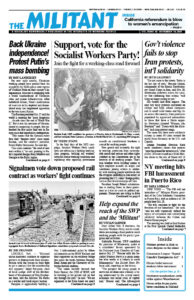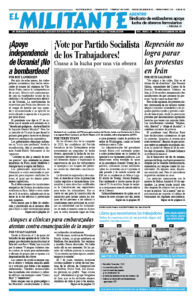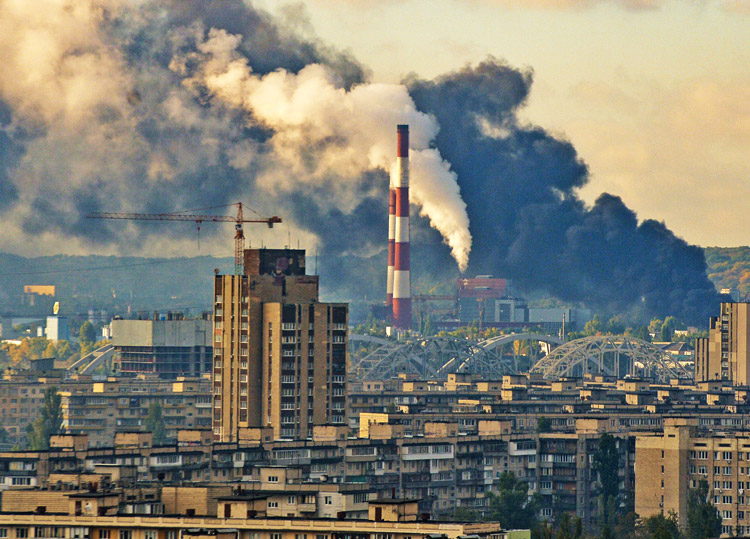For over eight months, Ukrainian working people have pushed back the assault by the KGB-police-state regime of Vladimir Putin on their country’s independence. Moscow is retaliating with a brutal bombardment of Ukrainian cities and power infrastructure. After battlefield defeats, Putin’s mobilization of reservists to his depleted and demoralized army has heightened opposition to the war across Russia.
The Russian president Oct. 27 said the world is entering the “most dangerous … decade since the end of World War II.” But it was his invasion of Ukraine, aimed at conquering its people, that unleashed the first major land war in Europe since that imperialist conflagration.
This means that the German rulers face their “deepest crisis” since reunification, said the country’s president, Frank-Walter Steinmeier, the next day.
This crisis contains “the seed of new wars within it,” he said, pointing to Putin’s imperial designs from Moldova and Georgia to the Baltic region.
Germany’s imperialist rulers are rearming to prepare for greater conflicts to come like other contending capitalist rulers worldwide.
In the latest attack on Ukrainian energy facilities, another barrage of Russian missiles targeted Kyiv, Kharkiv and other cities Oct. 31, damaging over a third of the power network and causing more rolling blackouts.
Putin hopes the lack of heat and power in winter will force Kyiv to concede territory to end the conflict. But the more the war has gone on, the more it has stiffened the resolve of working people in Ukraine to resist his efforts to destroy their country and culture.
Some of the deadliest combat is taking place over control of Bakhmut, a Ukrainian-held city in the eastern Donetsk region, where Ukrainian forces are inflicting heavy losses on the invaders. To compensate for the weakness of its own military, Moscow is relying on a mercenary outfit, the Wagner Group, to spearhead its assault. Among the mercenaries are Russian convicts who the Wagner Group promised to get released from jail if they’re willing to be cannon fodder on the frontlines for six months.
In the south, Ukrainian forces are closing in on Kherson, the only regional capital taken in Moscow’s invasion. The Kremlin is sending thousands of newly called-up reservists, who are poorly trained and equipped, to reinforce its defenses there. Ukrainians living under Moscow’s boot are sabotaging its positions as Ukrainian artillery pounds the Russian lines.
“The city is empty, as if it were dying. But we are alive,” a woman who gave her name only as Katerina, told the New York Times Oct. 31. The remaining residents are waiting, she said, “to meet the Armed Forces of Ukraine.”
Faced with large battlefield losses, Putin was forced to declare Russia’s largest troop mobilization since World War II Sept. 21. Widespread protests from Moscow and St. Petersburg to the non-Russian people of Dagestan and Yakutia erupted but were suppressed.
Call up targets migrant workers
Across Russia several army enlistment offices were firebombed. A disproportionate number of Moscow’s troops — and combat deaths — in Ukraine are from ethnic minorities in regions from Siberia to the North Caucasus. About a fifth of the Russian Federation’s population is spread among over 100 different oppressed nationalities.
After a recruitment office opened at Moscow’s main migrant service center, lawyers were inundated with pleas for help from Central Asian immigrant workers. Some were caught up in raids on hostels. Others without documents were coerced into signing up for the army.
An electrician in Moscow who is Russian-Tajik told the Washington Post that he was arrested at the construction site where he works because of his Caucasian appearance. “I’m not going to serve,” he told the paper. “Why take someone else’s land for yourself in the first place?”
In Belgorod, near the Ukrainian border, three Tajik recruits refused to be deployed to Ukraine Oct. 15, saying the Russian invasion was not their war. An officer told them the operation was “a holy war,” taunting the three Muslims that “Allah is a coward.” At firing practice the three killed the officer and nine others and injured 15. Two of the shooters were killed but one escaped.
Putin’s war lacks popular support elsewhere. Last month the mayor’s office in Ukhta, Komi Republic, tried to rename a local school after Arseny Pavlov, a local man who commanded pro-Moscow separatists fighting in Ukraine’s Donetsk region. Pavlov was killed in 2016 and posthumously decorated by Putin. But the proposal to name a school after him was dropped when residents objected. A memorial plaque to Pavlov in Ukhta has been defaced.
On Oct. 17, 108 Ukrainian women prisoners of war returned home in a POW swap. Held in concentration-camp conditions, they were never given proper food and health care and suffered torture and sexual abuse. Cut off from contact with Ukraine, the women saw only Russian television channels. But they soon detected signs of Moscow’s battlefield reversals.
The angrier TV anchors got, “the better we understood that Ukraine was winning,” Liudmila Guseinova said. That reality is clearer to millions more Russian working people too.


